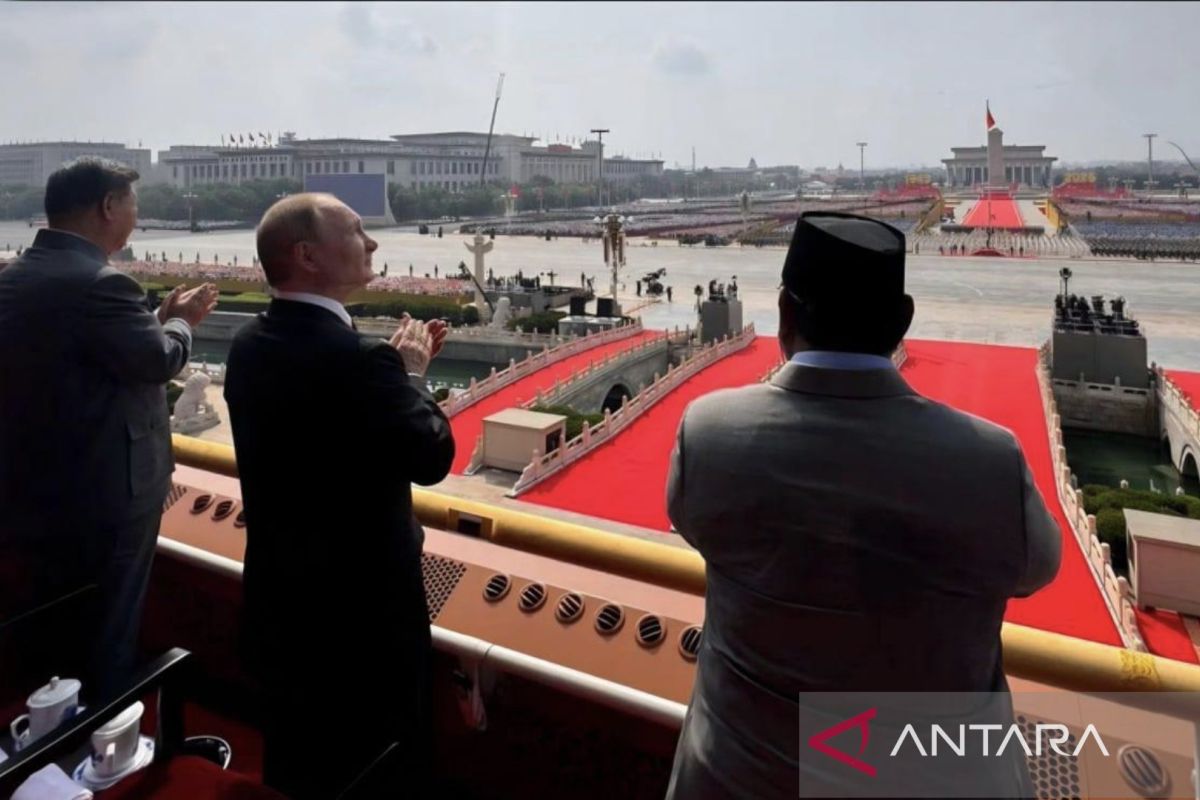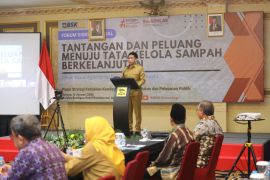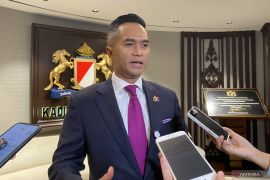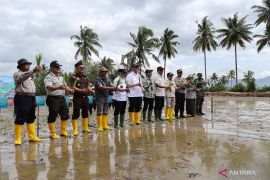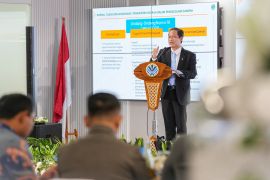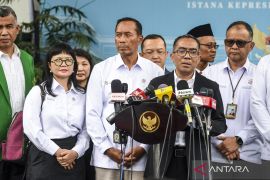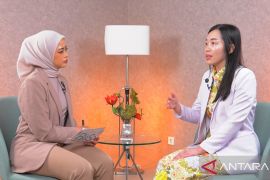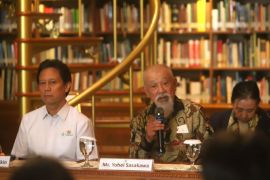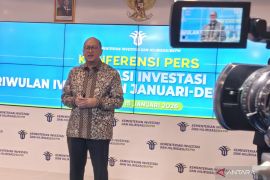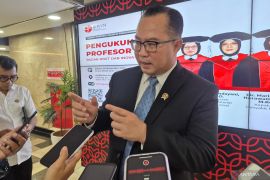Indonesia’s military rise is attributed to modernization of weapons systems, technology-driven strategies, personnel strength, and a growing domestic defense industry.Jakarta (ANTARA) - On Tuesday evening (September 2), President Prabowo Subianto confirmed he would proceed with his official visit to China, responding to an invitation from President Xi Jinping to attend the Chinese Armed Forces Military Parade in Beijing.
Amid easing tensions from recent demonstrations at home, Prabowo’s decision to attend the commemoration of the end of World War II came after strong requests from the Chinese government.
State Secretary Minister Prasetyo Hadi acknowledged that in recent days, Beijing had urged Prabowo to attend, even if only for one day.
The visit is considered significant for Indonesia, offering an opportunity to observe developments in China’s military capabilities while reinforcing Indonesia’s bilateral ties and asserting its diplomatic stance on the global stage.
Prabowo appeared in his signature “black peci diplomacy” attire, wearing a grey suit reminiscent of Indonesia’s first President Soekarno, marking his presence among 26 world leaders at Tiananmen Square.
They included Russian President Vladimir Putin, North Korean leader Kim Jong Un, Iranian President Masoud Pezeshkian, Pakistani Prime Minister Shehbaz Sharif, Mongolian President Khurelsukh Ukhnaa, and Belarusian President Alexander Lukashenko.
Slovak Prime Minister Robert Fico and Serbian President Aleksandar Vucic also attended, drawing attention for their well-known ties with Russia.
Beyond showcasing China’s military strength, the parade also served as a diplomatic platform, especially relevant for Prabowo, who has only recently begun his term as Indonesia’s president.
With Indonesia ranked 13th in global military strength by Global Firepower (GFP 2025) — and the strongest in Southeast Asia — its participation gained international attention.
Indonesia’s military rise is attributed to modernization of weapons systems, technology-driven strategies, personnel strength, and a growing domestic defense industry.
This progress has pushed Indonesia ahead of Vietnam (23rd) and Thailand (25th). Singapore ranks 29th, Myanmar 37th, the Philippines 41st, and Malaysia 42nd. Cambodia and Laos remain at the lower end of the rankings due to smaller capacities. In total, seven ASEAN states rank among the top 50.
Related news: Indonesia–China defence ties praised as model for ASEAN
Indonesia’s strategic position
Prabowo’s visit to China was not merely to fulfill an invitation, but also represented China’s recognition of Indonesia as a key middle power that plays a vital role in regional and global stability.
China, which holds the world’s third-strongest military after the United States and Russia, views Indonesia as an important partner in maintaining stability in the Indo-Pacific region.
With its strategic location along the Malacca Strait and the Natuna Sea, Indonesia holds a critical role in issues of territorial claims, economic interests, military strategy, and international diplomacy in the South China Sea.
As the world’s largest archipelagic nation, with a maritime area of approximately 5.9 million square kilometers under the United Nations Convention on the Law of the Sea (UNCLOS), Indonesia controls important global trade routes connecting the Indian and Pacific Oceans.
Control over Indonesia’s Archipelagic Sea Lanes (ALKI) strengthens the country’s position as a global maritime fulcrum in ensuring that international maritime traffic flows safely and in accordance with international law.
In geopolitical terms, countries that maintain strong relations with Indonesia may gain broader access to one of the busiest maritime trade routes in the world.
Related news: Cultural Goodwill Spice Route a boost to maritime axis status: govt
Recognition from France
France has also acknowledged Indonesia’s defense capability, as Paris seeks to maintain influence in the Indo-Pacific following the formation of the AUKUS defense alliance by Australia, the United Kingdom, and the United States in September 2021.
Under the alliance, Washington and London have agreed to assist Australia in developing and operating nuclear-powered submarines to strengthen the Royal Australian Navy.
In the Indonesia–France Joint Declaration Toward 2050: 100 Years of Diplomatic Relations for Sovereignty, Peace, and Prosperity, both nations committed to keeping the Indo-Pacific open, secure, and inclusive.
This aligns with France’s Indo-Pacific Strategy (2018) and ASEAN’s Outlook on the Indo-Pacific (2019).
Defense ties between Indonesia and France have continued to strengthen over time, as seen in Indonesia's participation in the 2025 Bastille Day parade, symbolizing strengthened defense diplomacy between the two countries.
This momentum was followed by ministerial bilateral dialogues that resulted in several agreements, including the awarding of an honorary rank by the French government to Indonesian Defense Minister Sjafrie Sjamsoeddin.
Strategic cooperation has also expanded into defense industries through technology transfers, joint production, and procurement of defense equipment such as fighter jets and submarines.
The two nations have also increased joint training, military personnel exchanges, and reaffirmed commitments to peacekeeping missions under the United Nations.
Related news: Indonesia-France Scorpene submarine project underway: Ministry
"Free and active"
President Prabowo's visit to Beijing and the defense partnership with France reflect Indonesia’s commitment in upholding the “free and active” foreign diplomacy.
Moreover, Indonesia’s growing recognition on the global stage is not solely rooted in its expanding military power, but also in how that strength is positioned within its foreign policy.
As the Indonesian Constitution mandates through the principle of "free and active", the nation’s military capacity must serve as a tool for peace, balance, and cooperation rather than domination.
By harmonizing defense modernization with diplomacy, Indonesia can assert its role as a middle power that safeguards maritime routes, supports global stability, and builds friendships without compromising independence or regional harmony.
This principle is in line with President Prabowo’s message: “A thousand friends are too few, one enemy is too many.”
Related news: Indonesia keen to befriend all countries: President Prabowo
Translator: Andi, Kenzu
Editor: M Razi Rahman
Copyright © ANTARA 2025
